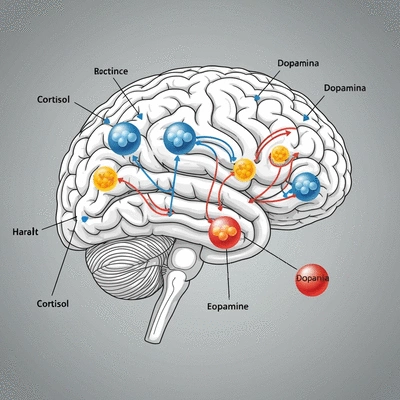Emotional Triggers: The Starting Point
Situations, events, or words that provoke a strong emotional response. Often linked to past experiences or current circumstances.
- Past negative experiences
- Feelings of inadequacy
- Specific sounds or scents

What if the key to managing your stress lies in understanding what triggers it? By identifying your emotional triggers, you can unlock pathways to a healthier mindset. Let’s delve into the essentials of recognizing and managing these triggers to enhance your emotional well-being.
This visual outlines the key steps and elements involved in how emotional triggers impact stress and practical steps for managing them.
Situations, events, or words that provoke a strong emotional response. Often linked to past experiences or current circumstances.
The brain (amygdala) rapidly processes triggers, releasing hormones like Cortisol (stress) and Dopamine (pleasure).
Heightened feelings of anxiety and stress, leading to a feedback loop that amplifies emotional responses.
Practical steps to identify and manage triggers for better emotional well-being and reduced stress.
Stress is a complex beast, often fueled by our own emotional triggers. But what exactly are these triggers? In simple terms, emotional triggers are situations, events, or even words that provoke a strong emotional response. Understanding these triggers is essential because they can significantly impact our mental well-being and stress levels. By recognizing these triggers, we can start to manage our stress more effectively.
At Stress Insight Solutions, I focus on helping individuals uncover their emotional triggers and understand how these triggers relate to their unique stress experiences. When we grasp the roots of our emotional responses, we can develop strategies to cope with stress in a healthier way!
Emotional triggers can stem from past experiences, current circumstances, or even our perceptions of future events. Common triggers might include:
By identifying these triggers, we can better manage our reactions. For instance, if you know that public speaking makes you anxious due to past experiences, you can prepare more effectively or practice stress-reduction techniques before a presentation.
To truly understand how emotional triggers affect stress, we need to dive into both psychology and biology. Our thoughts and feelings are intricately linked to our body's response to stress. The brain processes emotional triggers through a network of neurons and hormones, which is where the real magic—and chaos—happens.

Hormones such as cortisol and dopamine play pivotal roles in how we respond to stress. Cortisol, often dubbed the "stress hormone," is released when we perceive a threat. It prepares our body for a fight-or-flight response, which, while useful in emergencies, can lead to negative health outcomes when activated chronically. Research from the National Institutes of Health (NIH) discusses the intricate relationship between stress, hormones, and behavior. On the flip side, dopamine is linked to our feelings of pleasure and motivation. When our emotional triggers activate these hormones, it can lead to a cycle of stress and anxiety.
Neuroscience sheds light on how our brain processes these emotional triggers. For example, the amygdala, an almond-shaped cluster of nuclei in the temporal lobe, plays a crucial role in emotional regulation. When we encounter a trigger, the amygdala responds quickly, often before we have a chance to think rationally. This can lead to impulsive reactions that may increase stress levels. Insights from the National Center for Biotechnology Information (NCBI) further detail the neurobiology of stress. Understanding this process can help us take a step back and respond more thoughtfully!
There is a profound connection between emotional triggers and anxiety. When we experience a trigger, it can lead to heightened feelings of anxiety, creating a feedback loop where stress amplifies our emotional responses. This is why managing our emotional triggers is vital for mental health. By working to identify and understand these triggers, we can reduce our anxiety levels and cultivate a more peaceful mindset.
What strategies have you found most effective in managing your emotional triggers? Share your thoughts below:
Understanding and managing our emotional triggers is crucial for stress management. By identifying personal stressors, we equip ourselves with the knowledge needed to address them effectively. This awareness fosters resilience and empowers us to navigate the challenges life throws our way!
Here are some key points to remember:
As a clinical psychologist, I often see how awareness of triggers can lead to meaningful change. It’s not just about recognizing what stresses us, but also about understanding the why behind those feelings. By exploring these aspects, we can foster healthier relationships with ourselves and others.
Implementing emotional regulation techniques involves a few practical steps. Start small and gradually integrate these methods into your daily routine. Here are some effective strategies:
Incorporating these techniques not only helps in managing stress but also promotes a balanced and healthier lifestyle. Remember, it’s about finding what works best for you! Experiment with different approaches and observe how they impact your emotional state.
As you embark on your journey towards emotional well-being, I encourage you to engage with interactive tools and resources available through Stress Insight Solutions. These resources are designed to help you explore your emotional landscape and develop effective coping mechanisms.
Consider trying:
Engagement with these resources can provide valuable insights and foster a sense of community, making your journey feel a little less solitary!
Continued learning is vital in the quest for emotional well-being. Stay informed by reading articles, attending workshops, or following thought leaders in the field of stress management. At Stress Insight Solutions, we regularly update our content to provide you with the latest insights on emotional triggers and coping strategies!
Here are some ways to keep learning:
By actively seeking knowledge, you empower yourself to manage stress more effectively and understand your emotional responses better!

Finally, never underestimate the power of self-care and strong support systems. Make self-care a priority in your daily routine—whether that’s through engaging in hobbies, spending time with loved ones, or simply taking time to recharge. Remember, it's essential to check in with yourself regularly!
Building a support system can also be incredibly beneficial. Consider the following:
Incorporating these elements into your life can enhance your emotional resilience and make your stress management journey more effective. You’re not alone in this—you have the tools and the community to support you!
Here is a quick recap of the important points discussed in the article:
We illuminate the causes and effects of stress through science-informed resources, empowering you to recognize stressors and implement effective coping strategies. Your mental well-being is our priority.
